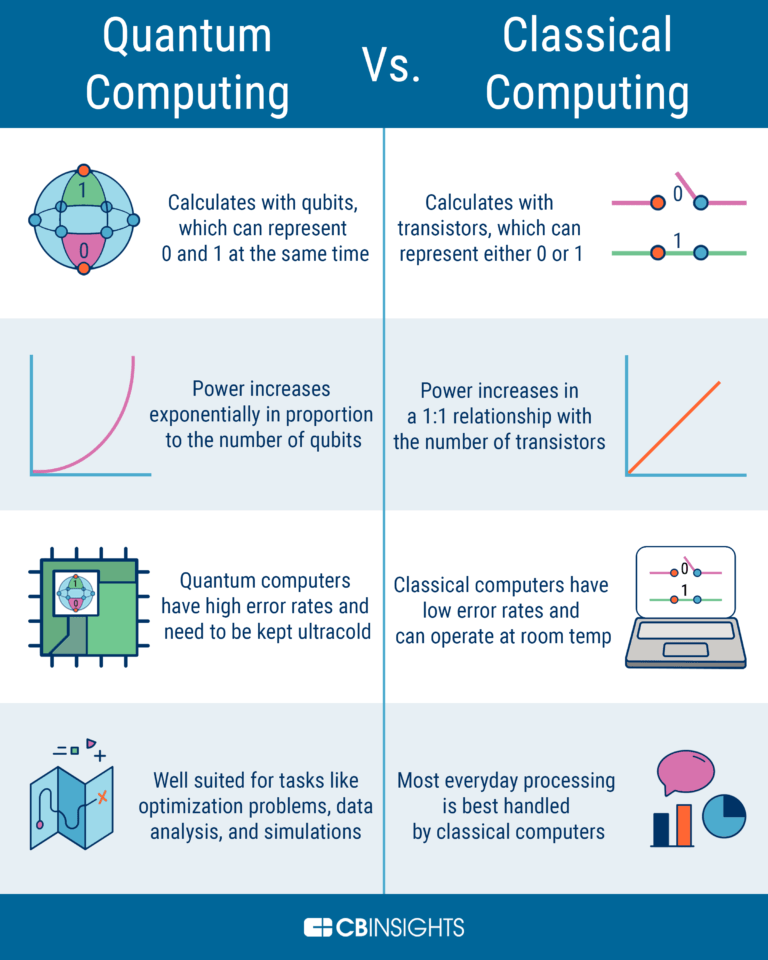What is Quantum Computing?

Till date the computers which we are using helped us to unlock the computing power that we couldn’t process with human power alone, but with quantum computing, we can take that power even further and we can use them to do more advance things more quickly and more efficiently. It work by using quantum mechanical phenomena to process massive data sets. Classical computers would get entangle with these datasets, but with quantum properties such as superposition of states and entanglement can speed up the processing power and it can handle a seemingly unlimited number of variables. Classical computers manipulate ones and zeroes to crunch through operations, but Quantum Computers will use qubits or quantum bits which mimic the state of subatomic particles and with quantum algorithms, it can process exponentially more data more efficiently wuth the help of quantum hardware. With help of Quantum Computing almost every industry from finance to agriculture, cybersecurity to artificial intelligence, all can reap the benefit of quantum processors.
What are the benefits of Quantum Computing?
- Like the first digital computers, quantum computers offer the possibility of technology exponentially more powerful than current systems.
- They stand to change companies, entire industries, and the world by solving problems that seem impossible today.
- Unbreakable encryption – Quantum computers will change the landscape of data security.
- Google announced it has a quantum computer that is 100 million times faster than any classical computer in its lab.
What is the differnce between Quantum Computing and Classical Computing?

What are the career benefits in Quantum Computing?
- Quantum computing is going to revolutionize the computing industry and engineers and experts quantum technology skills and its applications are likely to be in high demand in industries.
- A recently published report by Gartner pointing out that by 2023, 20% of IT organizations will be budgeting for quantum computing projects. And definitely like with all new technology introduced, organizations will face a shortage of experts in quantum computing.
- IBM’s unveiling of a 50 qubit chip in 2017 and the unveiling of the first commercial quantum computer in 2019 proves how much research is going into this tech.
- Google’s D-Wave, Alibaba’s Aliyun cloud unit, Microsoft’s partnership with Intel, and other big organizations are racing to be the next name in quantum computing research, which shows the possibilities of a great career in Quantum Computing.
- Career possibilities in Quantum Computing contains the quantum programming, RF engineering, optical measurement and communication, cryogenic design and engineering, and quantum system engineering.
Who should learn Quantum Computing?
- Anyone interested in quantum computing should learn about it, regardless of their background. However, there are certain groups of people who may be particularly interested in learning quantum computing, such as:
- Students and researchers in computer science, physics, and engineering: Quantum computing is a rapidly developing field, and there is a high demand for skilled workers. Students and researchers in these fields can gain a competitive advantage by learning about quantum computing.
- Software developers: Quantum computing will revolutionize many industries, and software developers will be in high demand to develop new quantum algorithms and applications.
- Business and finance professionals: Quantum computing has the potential to solve complex problems in finance, such as risk analysis and portfolio optimization. Business and finance professionals who learn about quantum computing can gain an edge over their competitors.
- Anyone who is curious about the future of technology: Quantum computing is one of the most exciting and transformative technologies of our time. Anyone who is interested in the future of technology should learn about quantum computing.
What are the pre-requsites to learn Quantum Computing?
- Learning quantum computing can be a challenging but rewarding endeavor. While you don’t necessarily need a specific background in physics or advanced mathematics to get started, having a strong foundation in certain areas can certainly be beneficial. Here are some prerequisites and recommended knowledge areas to help you get started with quantum computing:
- Mathematics:
- Linear Algebra: Understanding concepts like vector spaces, matrices, eigenvectors, and eigenvalues is crucial for understanding quantum mechanics and quantum algorithms.
- Calculus: Basic calculus concepts, including derivatives and integrals, are important for understanding the mathematical underpinnings of quantum physics.
- Probability and Statistics: Quantum computing often involves probabilistic outcomes, so a solid grasp of probability theory and statistics is helpful.
- Quantum Mechanics (Optional but beneficial):
- While not absolutely necessary, having a basic understanding of quantum mechanics can help you grasp the underlying principles of quantum computing. You can start with introductory quantum mechanics books or online resources.
- Programming:
- Proficiency in at least one programming language is essential for implementing and simulating quantum algorithms. Python is a commonly used language for quantum computing, and libraries like Qiskit (for IBM’s quantum devices) and Cirq (for Google’s quantum devices) provide useful tools and resources.
- Quantum Computing Concepts:
- Familiarize yourself with the foundational concepts of quantum computing, such as qubits, superposition, entanglement, and quantum gates.
- Computer Science Fundamentals:
- Understanding basic computer science concepts, including algorithms and data structures, will be useful when working on quantum algorithms and simulations.
- Quantum Computing Resources:
- Access to quantum computing resources, such as cloud-based quantum computing platforms, can help you experiment and practice with real quantum computers even if you don’t have access to a physical quantum computer.
- Online Courses and Books:
- Consider enrolling in online courses or reading books dedicated to quantum computing. Some popular online courses and books include those offered by IBM, MIT, and various universities.
- Patience and Dedication:
- Quantum computing can be a complex field, so it’s important to approach it with patience and dedication. Be prepared to spend time experimenting, learning, and troubleshooting.
How to learn Quantum Computing?

We are excited to publish our new Quantum Computing Course which will help you to explore the key concepts of quantum computing and find out how it’s changing computer science with the benefits it has. In this Quantum Computing Course, we will discuss all about to build quantum computers, cover the crucial principles in quantum computing, and take a look at some of the major quantum computing algorithms. This course will definitely help you to learn the Quantum Computing and move to fulfilling career in this evolving technology.
- What is Quantum Computing and How to learn it? - November 3, 2023
- Top 10 IT Corporate Training and Consulting Companies - October 11, 2023
- Google My Business Website – All you need to know? - August 25, 2023

